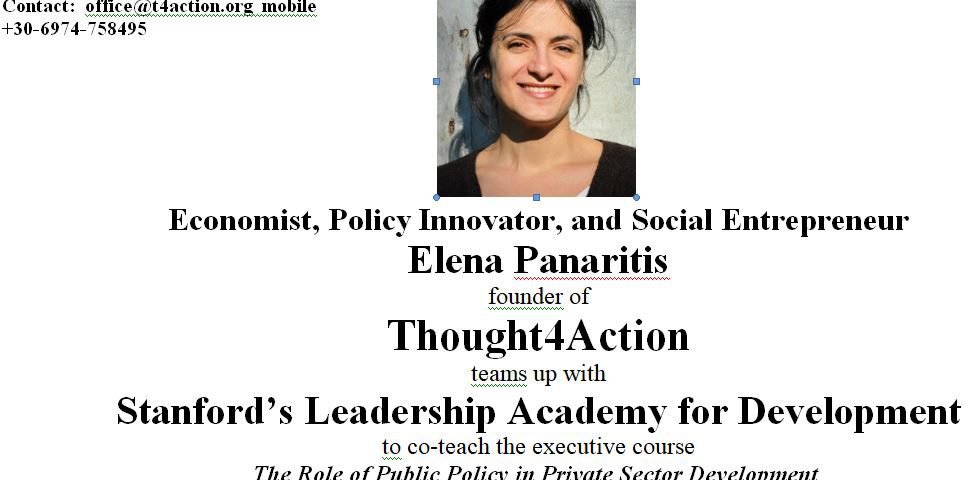Organized by the Leadership Academy for Development at Stanford and the Mediterranean School of Business, this four-day intensive program is aimed to train policymakers in complex Economic Decision Making; help create successful reformers and encourage government and private sector to play a pivotal role in equality and growth.
Elena http://stanford.io/2FBHDve will present new models for growth and demonstrate the importance of informality for sustainable growth and the creation of a robust middle class. “We will explore the intersection of politics with entrepreneurship in times of crisis and crisis prevention,” says Elena. “We will look at how change-makers can influence policymaking and politics so that they can boost overall prosperity.”
About Elena Panaritis
Elena’s reform methods revolutionized and forever changed how people and policymakers think about them; and specifically, about economic growth and justice through property rights’ reforms. She pioneered social entrepreneurship. Elena is renowned for her success in disrupting poverty, by transforming informal markets into vibrant, formal economic and social entities. She has worked with over 30 countries under crisis and distress with great success. In more than a decade at the World Bank, Elena spearheaded institutional/structural reforms including property rights reform in Peru (with a monumental outcome of 17m people as beneficiaries and a return of over 200 multiple). She received International Best Practice and Innovation awards from the US Government and the World Bank
Elena served as a senior economics advisor to three Greek Prime Ministers since 2009, as the special envoy for negotiations for the Euro-crisis and Greek-crisis. During 2009-2012 she served as an honorary Member of Parliament. She is the founder and CEO of Panel Group, a triple-bottom-line business that disrupts informality transforming rights of illiquid assets. In addition she is the founder of Thought for Action, a web-based platform that promotes innovation in economic policy, politics, and science in times of crisis and vast informality. It presents the remarkable successes of applying disruptive policies in the transformation of informality and in countries under solvency crisis. She has taught economic development, housing finance and property markets reform courses at the Wharton Business School, University of Pennsylvania, INSEAD, and the Johns Hopkins University – School of Advanced International Studies (SAIS). She blogs at: www.huffingtonpost.com


